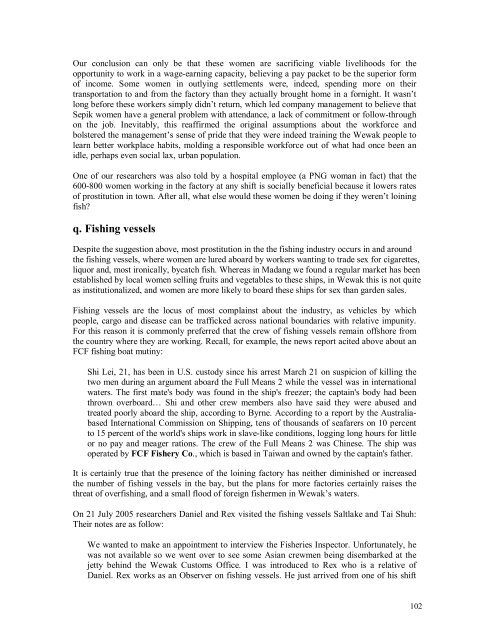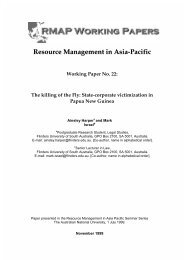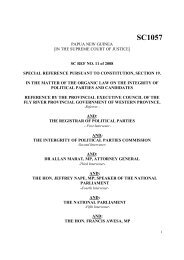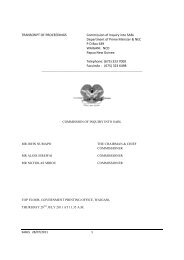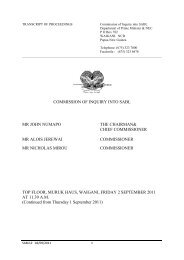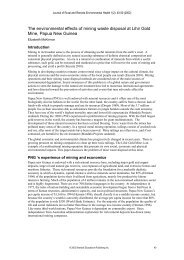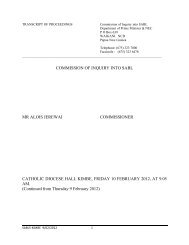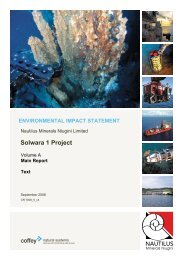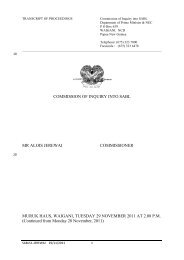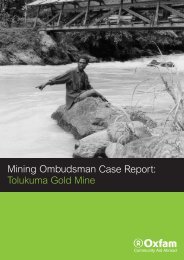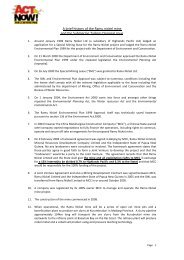Fishy business. The Social Impact of SST.pdf - Act Now!
Fishy business. The Social Impact of SST.pdf - Act Now!
Fishy business. The Social Impact of SST.pdf - Act Now!
Create successful ePaper yourself
Turn your PDF publications into a flip-book with our unique Google optimized e-Paper software.
Our conclusion can only be that these women are sacrificing viable livelihoods for theopportunity to work in a wage-earning capacity, believing a pay packet to be the superior form<strong>of</strong> income. Some women in outlying settlements were, indeed, spending more on theirtransportation to and from the factory than they actually brought home in a fornight. It wasn’tlong before these workers simply didn’t return, which led company management to believe thatSepik women have a general problem with attendance, a lack <strong>of</strong> commitment or follow-throughon the job. Inevitably, this reaffirmed the original assumptions about the workforce andbolstered the management’s sense <strong>of</strong> pride that they were indeed training the Wewak people tolearn better workplace habits, molding a responsible workforce out <strong>of</strong> what had once been anidle, perhaps even social lax, urban population.One <strong>of</strong> our researchers was also told by a hospital employee (a PNG woman in fact) that the600-800 women working in the factory at any shift is socially beneficial because it lowers rates<strong>of</strong> prostitution in town. After all, what else would these women be doing if they weren’t loiningfish?q. Fishing vesselsDespite the suggestion above, most prostitution in the the fishing industry occurs in and aroundthe fishing vessels, where women are lured aboard by workers wanting to trade sex for cigarettes,liquor and, most ironically, bycatch fish. Whereas in Madang we found a regular market has beenestablished by local women selling fruits and vegetables to these ships, in Wewak this is not quiteas institutionalized, and women are more likely to board these ships for sex than garden sales.Fishing vessels are the locus <strong>of</strong> most complainst about the industry, as vehicles by whichpeople, cargo and disease can be trafficked across national boundaries with relative impunity.For this reason it is commonly preferred that the crew <strong>of</strong> fishing vessels remain <strong>of</strong>fshore fromthe country where they are working. Recall, for example, the news report acited above about anFCF fishing boat mutiny:Shi Lei, 21, has been in U.S. custody since his arrest March 21 on suspicion <strong>of</strong> killing thetwo men during an argument aboard the Full Means 2 while the vessel was in internationalwaters. <strong>The</strong> first mate's body was found in the ship's freezer; the captain's body had beenthrown overboard… Shi and other crew members also have said they were abused andtreated poorly aboard the ship, according to Byrne. According to a report by the AustraliabasedInternational Commission on Shipping, tens <strong>of</strong> thousands <strong>of</strong> seafarers on 10 percentto 15 percent <strong>of</strong> the world's ships work in slave-like conditions, logging long hours for littleor no pay and meager rations. <strong>The</strong> crew <strong>of</strong> the Full Means 2 was Chinese. <strong>The</strong> ship wasoperated by FCF Fishery Co., which is based in Taiwan and owned by the captain's father.It is certainly true that the presence <strong>of</strong> the loining factory has neither diminished or increasedthe number <strong>of</strong> fishing vessels in the bay, but the plans for more factories certainly raises thethreat <strong>of</strong> overfishing, and a small flood <strong>of</strong> foreign fishermen in Wewak’s waters.On 21 July 2005 researchers Daniel and Rex visited the fishing vessels Saltlake and Tai Shuh:<strong>The</strong>ir notes are as follow:We wanted to make an appointment to interview the Fisheries Inspector. Unfortunately, hewas not available so we went over to see some Asian crewmen being disembarked at thejetty behind the Wewak Customs Office. I was introduced to Rex who is a relative <strong>of</strong>Daniel. Rex works as an Observer on fishing vessels. He just arrived from one <strong>of</strong> his shift102


